There aren’t many baby girl names more popular than girl names that start with M.
Arbor Day is here — and we’re celebrating with a tree-mendous list of tree names for your baby!
Names like Olivia, Aspen, Willow and Forrest have been popular for decades, while other tree baby names like Elowen, Koa, Oakley and Ash have only recently gained popularity in the United States.
But before we get into some of our favorites, let’s make sure we all understand the importance of this day.
Arbor Day, which lands on April 25 this year, is a national holiday dedicated to planting trees and raising awareness about the importance of trees and forests in our environment.
As former secretary of agriculture Julius Sterling Morton once said, “Arbor Day is not like other holidays. Each of those reposes on the past, while Arbor Day proposes for the future."
And since it’s celebrated annually on the last Friday in April, Arbor Day is the perfect source of inspiration for a late-April baby’s name — or for tree-loving parents who want a meaningful name for their child.
After all, former President Grover Cleveland once uttered this masterful quote: “A people without children would face a hopeless future; a country without trees is almost as helpless."
So, follow along as we branch out into our favorite tree names for girls and boys — many of which are gender-neutral and ready to be picked (or, in this case, planted).
Cypress

Origin: Greek; Late Latin
Meaning: Cypress tree
Cypress, pronounced SYE-priss, derives from the Late Latin word cypressus and Greek word kyparissos, referring to the evergreen tree (scientific name Cupressus) that can reach up to 30 metres in height.
RELATED: 60+ Earthy Names for Girls Born On or Around Earth Day
Spruce

Origin: Old French; Middle English
Meaning: From Prussia; Spruce tree
Spruce, pronounced SPROOS, comes from the Old French name Pruce and Middle English name Sprws, referring to someone “from Prussia.” The spruce tree is a type of evergreen tree that belongs to the family of pines.
Oak
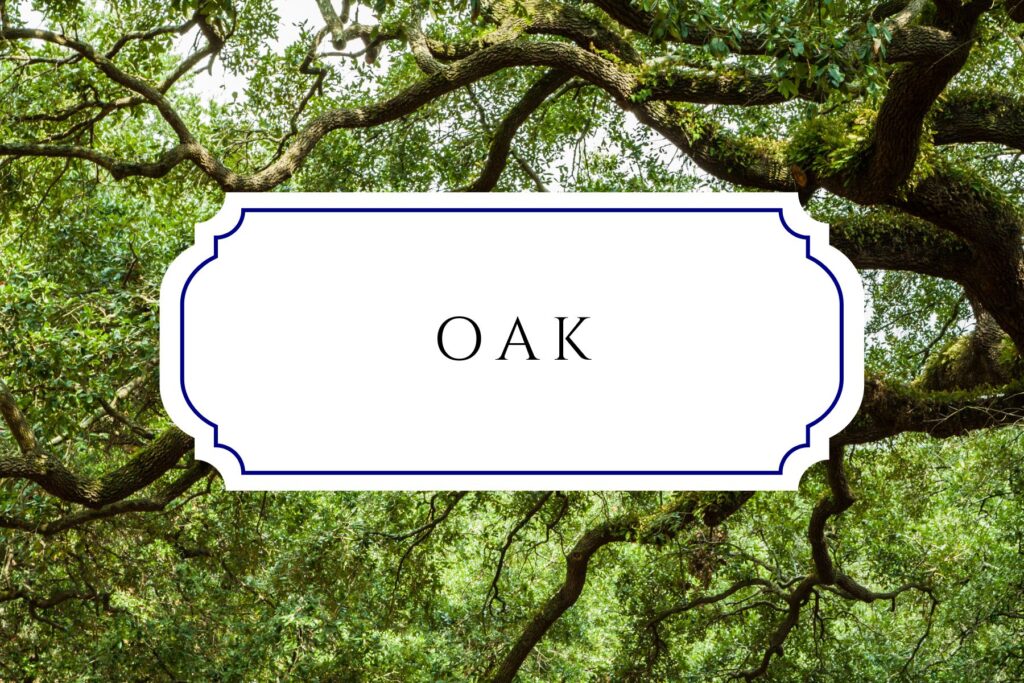
Origin: English; Old Norse
Meaning: Oak tree
Oak, pronounced OHK, comes from the Middle English word oke, Old English word ac and Old Norse word eik, referring to the oak tree — a long-lived deciduous or evergreen hardwood tree of the genus Quercus.
Oakley

Origin: English
Meaning: Oak tree meadow; Oak tree clearing
Oakley, pronounced OHK-lee, comes from the Middle English words oke, referring to the oak tree, and legh, meaning “clearing” or “meadow.” Therefore, Oakley refers to a meadow of oak trees or a clearing among the oak trees.
Willow

Origin: Old English
Meaning: Willow tree
Willow, pronounced WIL-oh, comes from the Old English word welig, referring to the willow tree — a deciduous tree with long, slender branches and narrow leaves that's often found growing near water.
Olivia

Origin: Latin
Meaning: Olive tree
Olivia, pronounced oh-LIV-ee-ah, derives from the Latin word oliva, meaning "olive tree." This has been the No. 1 most popular girl’s name in the United States every year since 2019 — and top-5 since 2008.
Oliver

Origin: French; Latin
Meaning: Olive tree
Oliver, pronounced OL-i-ver, comes from the Old French name Olivier, which was likely derived from the Latin word oliva, referring to the olive tree. Oliver has been the 3rd-most popular boy’s name since 2019.
Olive
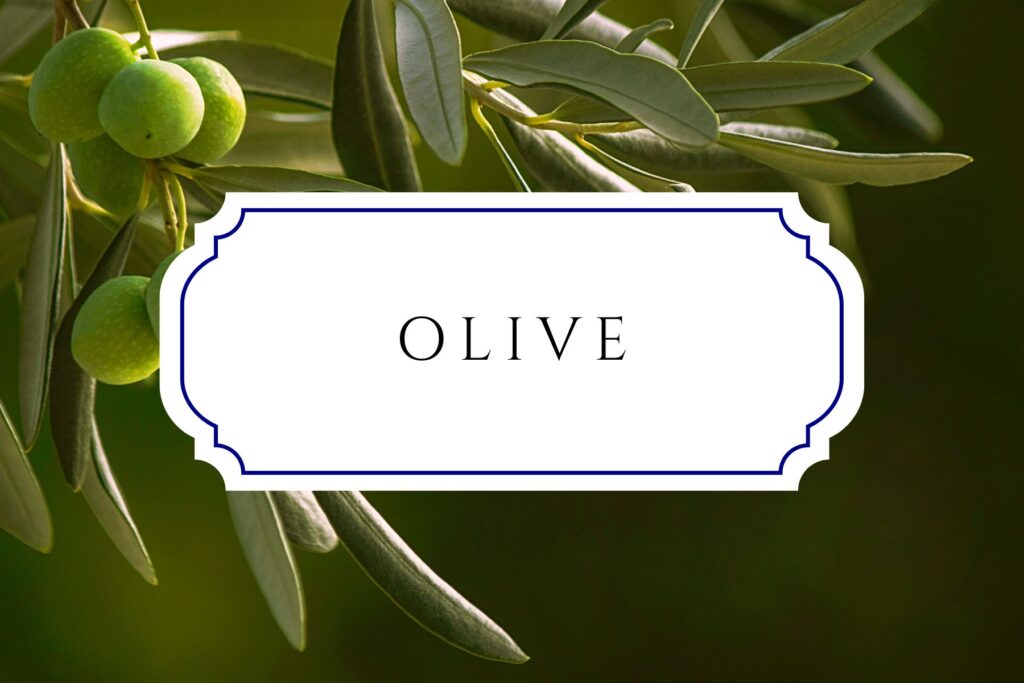
Origin: English; Latin
Meaning: Olive; Olive tree
Olive, pronounced OL-iv, derives directly from the English word olive, referring to the fruit from the olive tree (oliva in Latin). The scientific name for olive is Olea europaea, so add Olea to your list of tree names.
Aspen
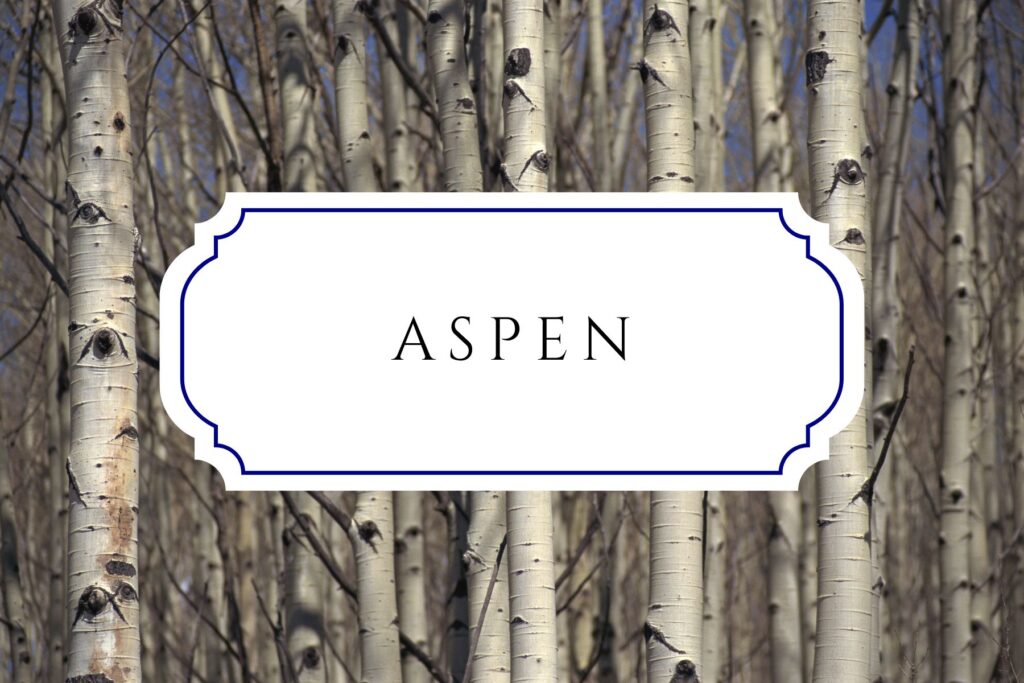
Origin: Old English
Meaning: Aspen tree; City in Colorado
Aspen, pronounced AS-pen, comes from the Old English word æspe, referring to the aspen tree known for its white bark and vibrant yellow fall foliage. This name can also refer to the city of Aspen in Colorado, known for its world-class ski resorts.
Forrest
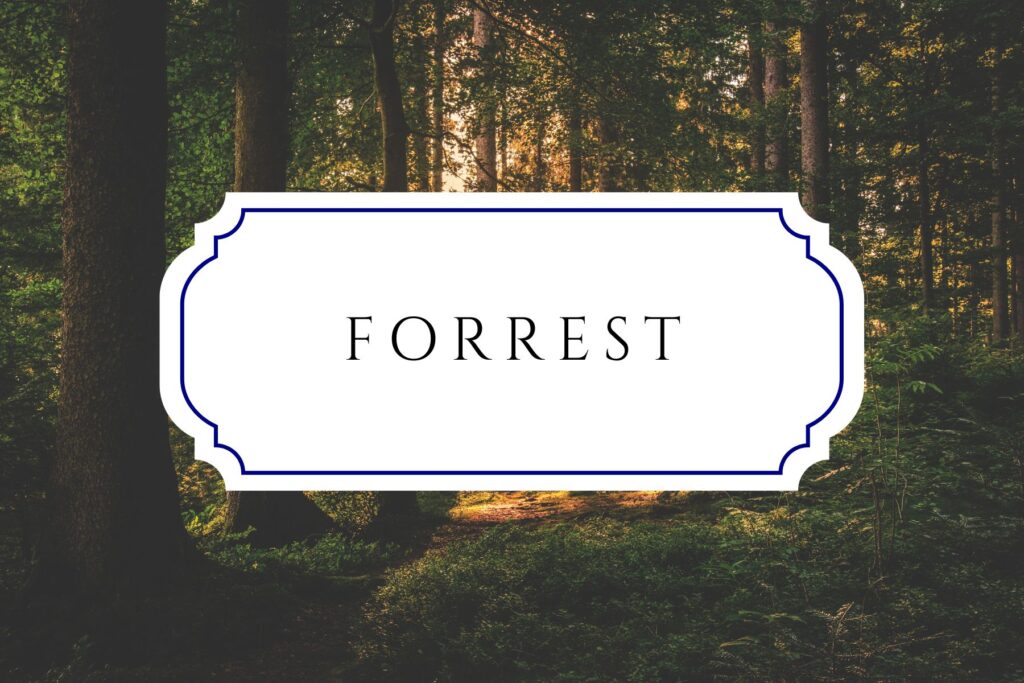
Origin: English; Old French
Meaning: Large area covered with trees
Forrest, pronounced FOR-est, comes directly from the English word forest and Old French word forest, referring to a large area covered with trees. It was traditionally given to someone who lived or worked in a forest.
Koa

Origin: Hawaiian
Meaning: Warrior; Koa tree
Koa, pronounced KOH-ah, comes directly from the Hawaiian word koa, which means “warrior” but can also refer to the native Hawaiian koa tree (scientific name Acacia koa) endemic to the Hawaiian Islands.
Elowen

Origin: Cornish
Meaning: Elm tree
Elowen, pronounced EL-oh-wen, derives from the Cornish language where elowen means "elm tree." The elm tree is known for its distinctive vase-shaped crowns, arching branches and serrated leaves.
Ash
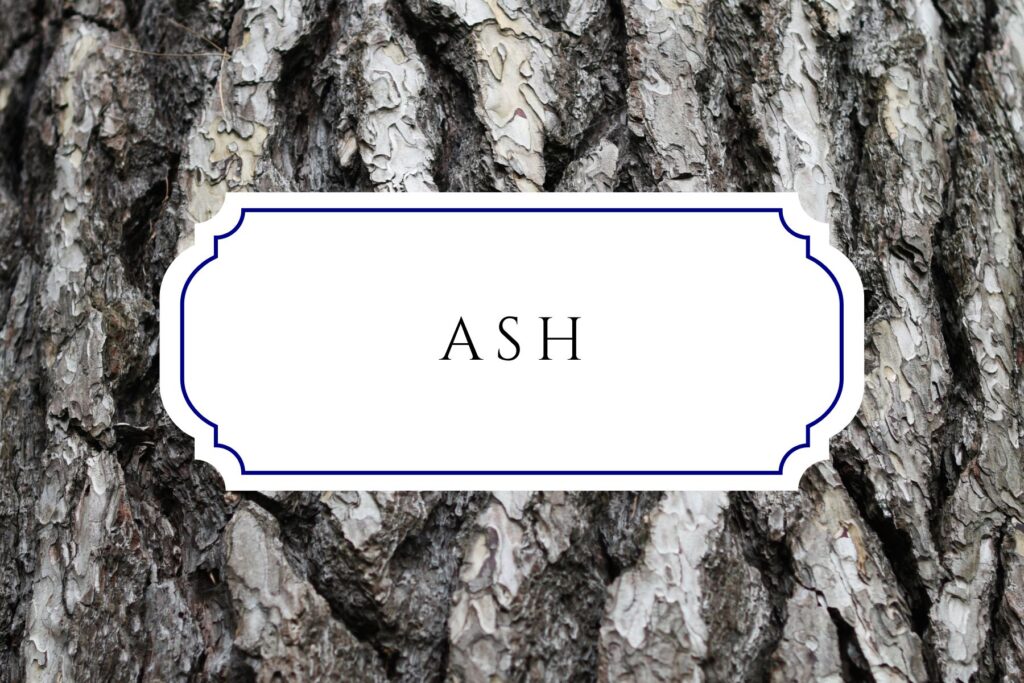
Origin: Old English
Meaning: Ash tree; Fire residue
Ash, pronounced ASH, comes from the Old English word æsce, referring to the ash tree — a tall, deciduous tree known for its strength and elasticity. It can also refer to the residue left after a fire.
Ashley

Origin: Old English
Meaning: Ash tree clearing; Ash tree meadow
Ashley, pronounced ASH-lee, is a combination of the Old English words æsc, meaning “ash tree,” and leah, meaning “meadow” or “clearing.” It was originally a boy’s name but is now more common with girls.
Ashton

Origin: Old English
Meaning: Town of ash trees; Ash tree settlement
Ashton, pronounced ASH-tun, is a combination of the Old English words æsc, meaning “ash tree,” and tun, meaning “town” or “settlement.” It was popularized by Ashton Main from the 1985 miniseries “North and South.”
Alder

Origin: Old English
Meaning: Alder tree
Alder, pronounced AWL-der, comes from the Old English word alor, referring to the alder tree — a deciduous tree often found near water and known for its rot-resistant wood and erosion prevention.
Torreya

Origin: English
Meaning: Torrey’s tree, Torreya tree
Torreya, pronounced tor-RAY-ah, is derived from the scientific genus name for a rare type of coniferous tree mainly found in Florida. The genus was named in honor of American botanist John Torrey (1796-1873).
Acacia

Origin: Greek; English
Meaning: Acacia tree; Thorny tree
Acacia, pronounced uh-KAY-sha, comes from the Greek word akakia derived from the Greek word ake, meaning “thorn” or “point.” Acacia trees are known for clusters of small flowers and often thorny branches.
Elmer

Origin: Old English
Meaning: Noble; Famous; Elm tree
Elmer, pronounced EL-mer, derives primarily from the Old English words æðel, meaning “noble,” and mær, meaning “famous,” though some parents like to associate it with elm trees due to the first syllable.
Elwood

Origin: Old English
Meaning: Elder tree forest; Old forest
Elwood, pronounced EL-wood, combines either the Old English ellen, meaning “elder tree,” or eald, meaning “old,” with wudu, meaning “wood,” creating a name that means "elder tree forest" or "old forest."
Magnolia

Origin: French; Latin
Meaning: Magnolia tree; Magnol’s flower
Magnolia, pronounced mag-NOH-lee-ah, is named after the magnolia tree, itself named in honor of French botanist Pierre Magnol (1638-1715). The magnolia is one of the oldest flowering plants on Earth.
Laurel

Origin: Latin
Meaning: Laurel tree; Bay laurel; Victory wreath
Laurel, pronounced LOR-el, derives from the Latin word laurus, referring to the laurel tree or bay laurel. In ancient Greece and Rome, laurel wreaths were often used as crowns to symbolize victory and honor.
Birch
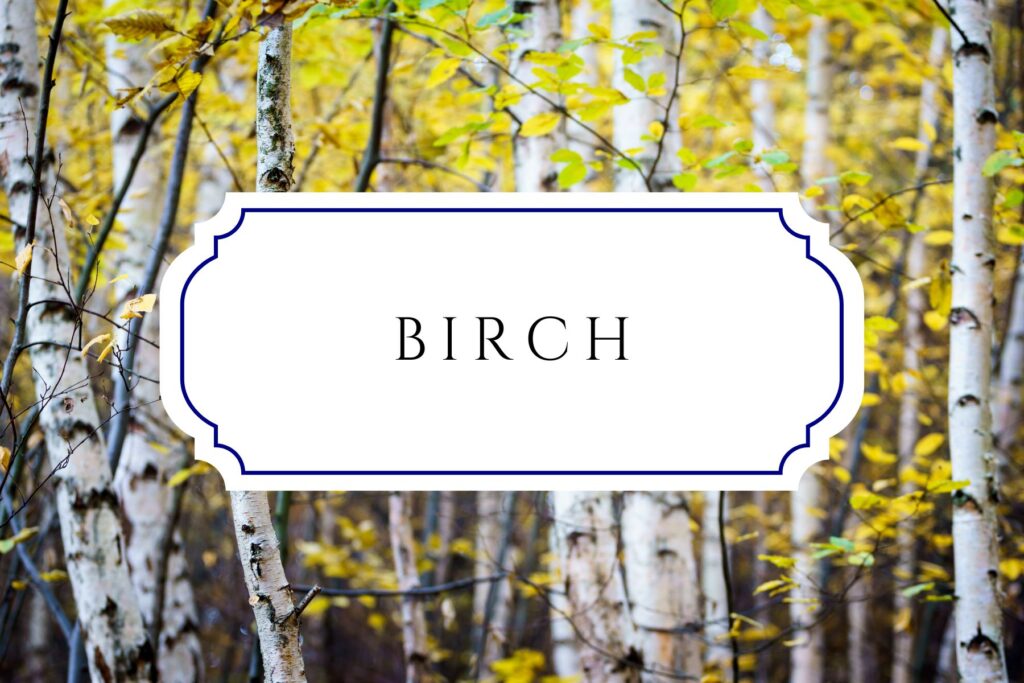
Origin: Old English
Meaning: Birch tree; White tree
Birch, pronounced BURCH, comes from the Old English words berc or beorc, referring to the birch tree — a deciduous hardwood tree widely recognized for its distinctive, peeling white bark and thin trunk.
Maple

Origin: Old English
Meaning: Maple tree; Syrup
Maple, pronounced MAY-pul, derives from the Old English words mapel and mapultreow, referring to the maple tree known for producing maple syrup, their stunning fall foliage and their valuable hardwood.
Cedar

Origin: Latin; Greek
Meaning: Cedar tree
Cedar, pronounced SEE-der, comes from the Latin word cedrus and Greek word kedros, referring to the cedar tree — an aromatic evergreen conifer known for its durable, fragrant wood often used as timber.
Ayla

Origin: Hebrew; Turkish
Meaning: Oak tree; Terebinth tree; Moonlight
Ayla, pronounced AY-lah, has multiple origins including Turkish where it means "moonlight." In Hebrew, Ayla is a diminutive of elon, meaning “oak tree,” or elah, meaning "terebinth tree,” a deciduous shrub species.
Alani

Origin: Hawaiian
Meaning: Orange; Orange tree
Alani, pronounced ah-LAH-nee, comes from the Hawaiian word for "orange" or "orange tree." In addition to their orange-colored fruit, orange trees are known for their evergreen nature and fragrant white flowers.
Sequoia

Origin: Native American (Cherokee)
Meaning: Sequoia tree; Giant tree
Sequoia, pronounced sih-KWOY-ah, is named after the giant sequoia tree native to California, itself named in honor of Sequoyah (c.1770-1843), the Cherokee silversmith who created the Cherokee syllabary.
Rowan

Origin: Gaelic
Meaning: Rowan tree; Little red one
Rowan, pronounced ROW-an, comes from the Gaelic word ruadh, meaning "red," and refers to the rowan tree (mountain ash), known for its bright red berries. In Celtic mythology, the rowan was considered a protective tree.
Holly

Origin: Old English
Meaning: Holly tree
Holly, pronounced HOL-ee, derives from the Old English word holegn and holen, referring to the holly tree — an evergreen tree known for its prickly, evergreen leaves and bright red berries. Holly is also a common Christmas decoration.
Linnea

Origin: Swedish; Latin
Meaning: Linnaea flower; Lime tree; Linden tree
Linnea, pronounced lin-NAY-ah, is named after the linnaea flower (twinflower) named after Swedish botanist Carl Linnaeus (1707-1778). It can also translate to “lime tree” or “linden tree” in some languages.
Lyndon

Origin: Old English
Meaning: Linden tree hill
Lyndon, pronounced LIN-don, derives from Old English elements lind, meaning “linden tree,” and dun, meaning “hill,” ultimately referring to a hill where linden trees grow. Linden trees are large graceful deciduous trees.
Sylvia

Origin: Latin
Meaning: Woods; Forest
Sylvia, pronounced SIL-vee-ah, is a variant of the names Silvia and Silvius, which are derived from the Latin word silva, meaning “woods” or “forest.” It’s the name of former pope Gregory the Great’s mother.
Sylvie

Origin: Latin; French; Czech
Meaning: Woods; Forest
Sylvie, pronounced SIL-vee, is the French and Czech variant of Sylvia, derived from the Latin word silva, meaning "forest" or "woods." Though not inspired by a specific tree, forests usually have a wide range of different types of trees.
Lennox

Origin: Scottish; Gaelic
Meaning: Field of elm trees; Place with elm trees
Lennox, pronounced LEN-iks, comes from the Scottish place name derived from Gaelic elements possibly meaning "field of elm trees" or "place with elm trees." It could also be inspired by names like Lennon and Knox.
Nash
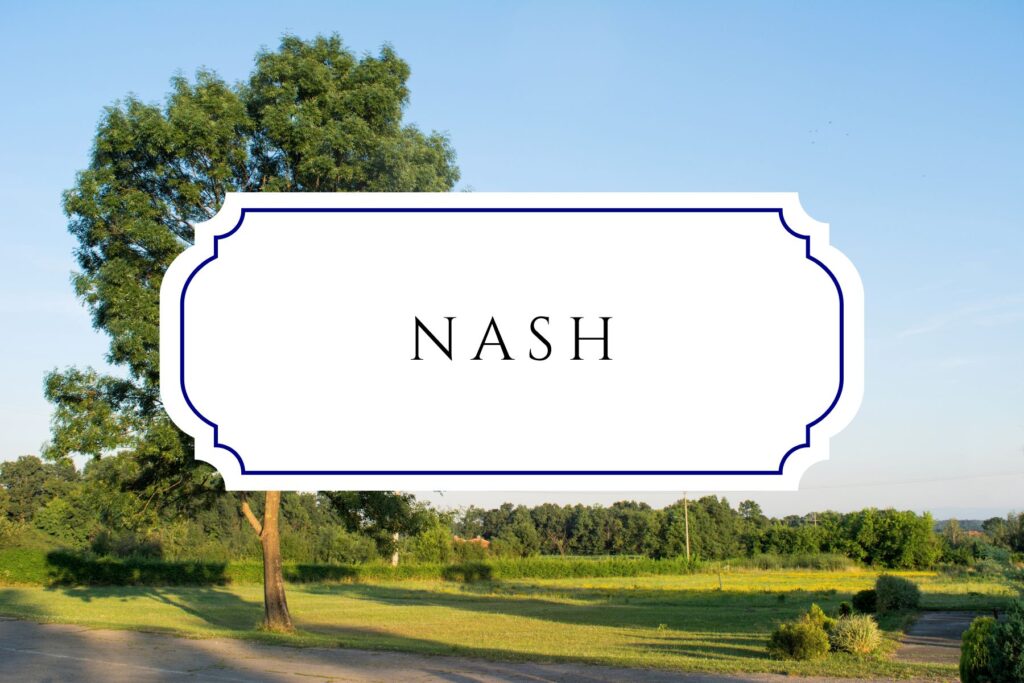
Origin: Middle English
Meaning: At the ash tree; Dweller by the ash tree
Nash, pronounced NASH, derives from the Middle English phrase atten ash, meaning "at the ash tree" or "dweller by the ash tree." It was originally a surname for someone who lived near a prominent ash tree.
Ewan

Origin: Gaelic; Old Irish
Meaning: Born by a yew tree
Ewan, pronounced YOO-an, is the Anglicized form of the Gaelic name Eóghan, which is composed of the Old Irish elements eó, meaning "yew," and the suffix gan, meaning "born.” Yew trees are known for their longevity.
Oren

Origin: Hebrew
Meaning: Pine tree
Oren, pronounced OR-en, comes directly from the Hebrew word for "pine tree." Pine trees are among the few trees that don’t have flowers or fruits and are known for their needle-like leaves and pine cones.
Cassia
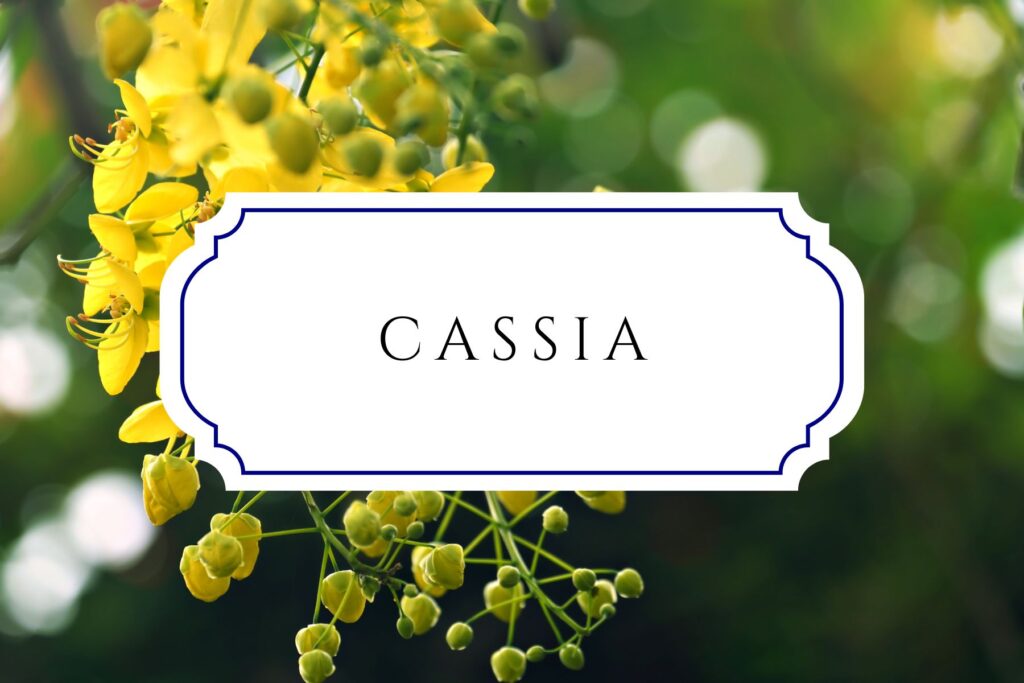
Origin: Greek; Latin
Meaning: Cassia tree; Cinnamon; Empty
Cassia, pronounced KASH-ah or KAS-ee-ah, derives from the Greek and Latin name for the cassia tree, a relative of cinnamon known for its aromatic bark. It can also be a variant of Cassius, meaning “empty.”
Keziah

Origin: Hebrew
Meaning: Cassia tree; Cinnamon
Keziah, pronounced keh-ZYE-ah, comes from Hebrew and appears in the Bible as one of Job's daughters. The name comes from the Hebrew name Qetsiʿa, which is believed to mean “cassia tree” or “cinnamon.”
Hazel

Origin: Old English
Meaning: Hazel tree; Hazel nuts; Light brown color
Hazel, pronounced HAY-zul, comes from the Old English word hæsel, referring to the hazel tree — known for producing edible nuts and flexible wood. Hazel can also refer to the earthy, light brown color.
Juniper

Origin: Latin
Meaning: Juniper tree; Juniper berries
Juniper, pronounced JOO-ni-per, derives from the Latin word iuniperus, referring to the juniper tree — an evergreen conifer known for its berries used in flavoring gin. Its leaves are either needle-like or scale-like.
Elon

Origin: Hebrew
Meaning: Oak tree
Elon, pronounced EE-lon, comes directly from the Hebrew word for "oak tree,” which are known for their long lifespans and strong and durable wood. In the Bible, Elon was a judge of Israel from the Tribe of Zebulun.
Lauretta

Origin: Latin; English
Meaning: Small laurel tree
Lauretta, pronounced lor-ET-ah, is a diminutive form of Laura, which derives from the Latin word laurus, referring to the laurel tree or bay laurel. The suffix -etta adds the meaning "small" or "little.”
Tamara

Origin: Hebrew
Meaning: Date palm tree
Tamara, pronounced tuh-MAR-ah, derives from the Hebrew word tamar, meaning "date palm tree." In biblical tradition, the date palm symbolizes fertility and grace. The tree is cultivated for its edible sweet fruit called dates.
Amir

Origin: Arabic; Hebrew
Meaning: Treetop; Prince; Commander
Amir, pronounced ah-MEER, primarily means "prince" or "commander" in Arabic, but in Hebrew, it can also mean "treetop" or "summit of a tree” — giving this name a powerful, yet natural meaning and origin.
Yvonne

Origin: French; Germanic
Meaning: Yew tree
Yvonne, pronounced ih-VON, is the feminine form of Yvon, which derives from the Germanic name Yvo, connected to the word for "yew tree." The yew is an ancient tree known for its longevity and toxic berries.
Grover

Origin: Old English
Meaning: Grove dweller; One who lives in or near a grove
Grover, pronounced GROH-ver, comes from Old English graf meaning "grove" and the suffix -er indicating a person, thus "one who lives in a grove" or "grove dweller." A grove is a group of trees or wooded area.
Eoghan
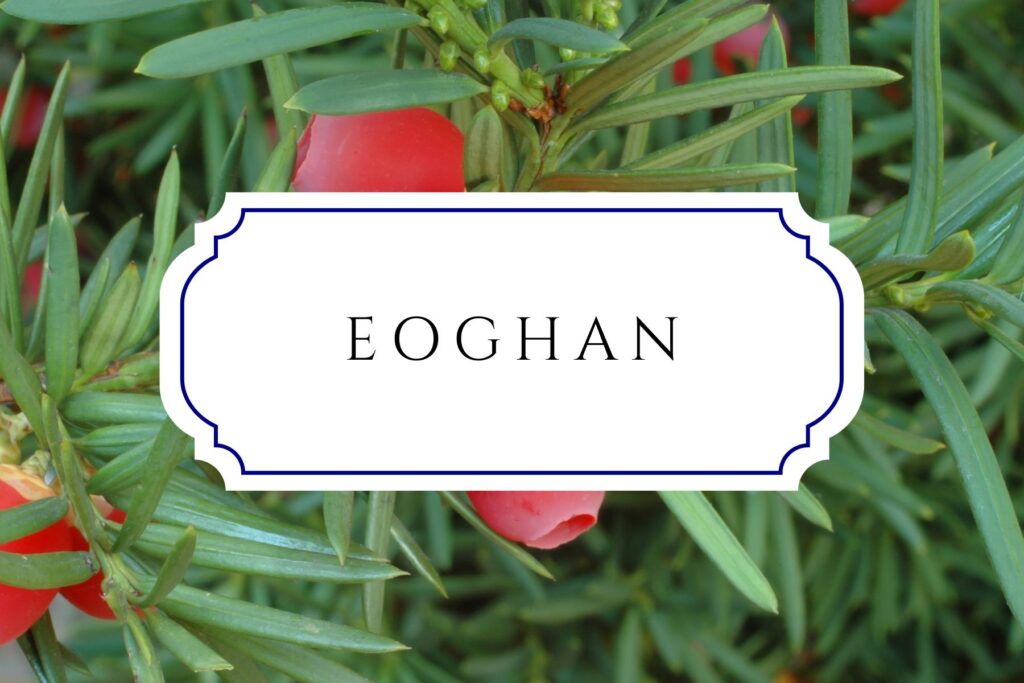
Origin: Old Irish; Gaelic
Meaning: Born by a yew tree
Eoghan, pronounced OH-in or YOH-an, is a Gaelic name composed of the Old Irish elements eó, meaning "yew," and the suffix gan, meaning "born.” Yew trees are known for their longevity and toxic berries.
Sycamore

Origin: Latin; Greek
Meaning: Sycamore tree; Fig-mulberry
Sycamore, pronounced SIK-uh-mor, derives from the Latin word sycomorus and Greek word sykomoros, meaning “fig-mulberry.” They sycamore tree is a large deciduous tree with distinctive peeling bark and broad leaves.
Pomona
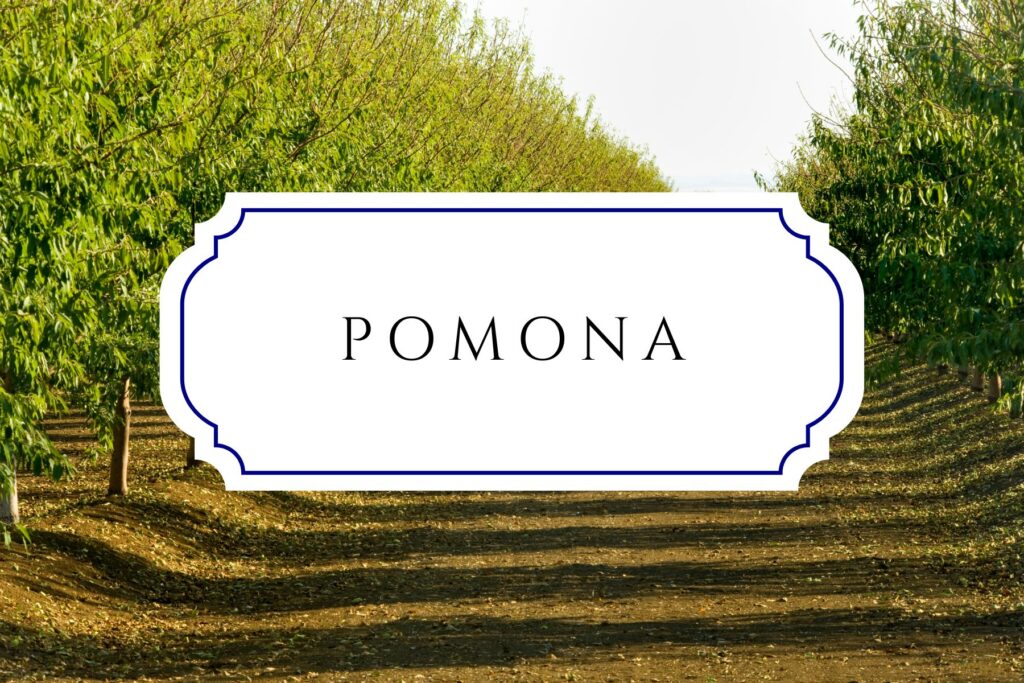
Origin: Latin
Meaning: Fruit; Fruit tree
Pomona, pronounced poh-MOH-nah, derives from the Latin word pomum, meaning "fruit" or "fruit tree." In Roman mythology, Pomona was the goddess of fruit trees, gardens and orchards — particularly apple trees.
Go Beyond Tree Names With Botanical Names

Tree names for boys and girls is a great way to celebrate nature on a special day like Earth Day.
But why stop there when you have so many nature-inspired baby names to choose from — especially botanical names, which include everything from flower names to plant names and even herbs or spices.
Names like Azalea, Zinnia and Dahlia are tied to flowers, while names like Sage, Fern, Ivy and Reed are inspired by plants.
And with Earth Day being celebrated on April 22 each year, you can always go with a land- or Earth-inspired name for your baby — such as Terra, Tierra, Gaia, Sienna, Adam or Zemyna.
The point is your options are endless — but don’t worry, Mod Moms Club is here to help!
ALSO ON MOD MOMS CLUB: 80+ Baby Names With Number-Related Meanings
And if you feel overwhelmed by the possibilities, don’t forget about our baby name generator that’s specifically designed to make the baby-naming process easy and effortless for expecting parents.












